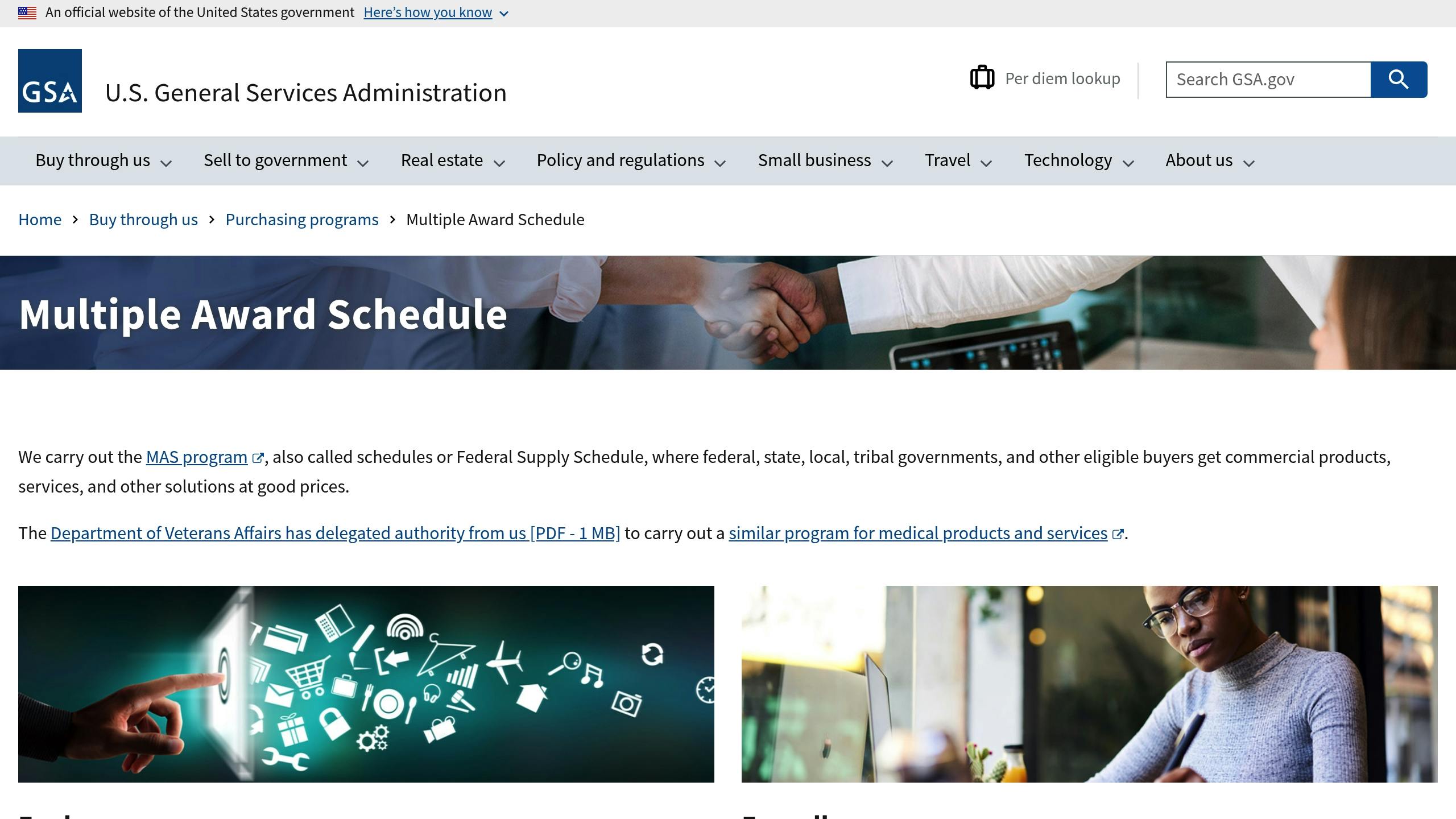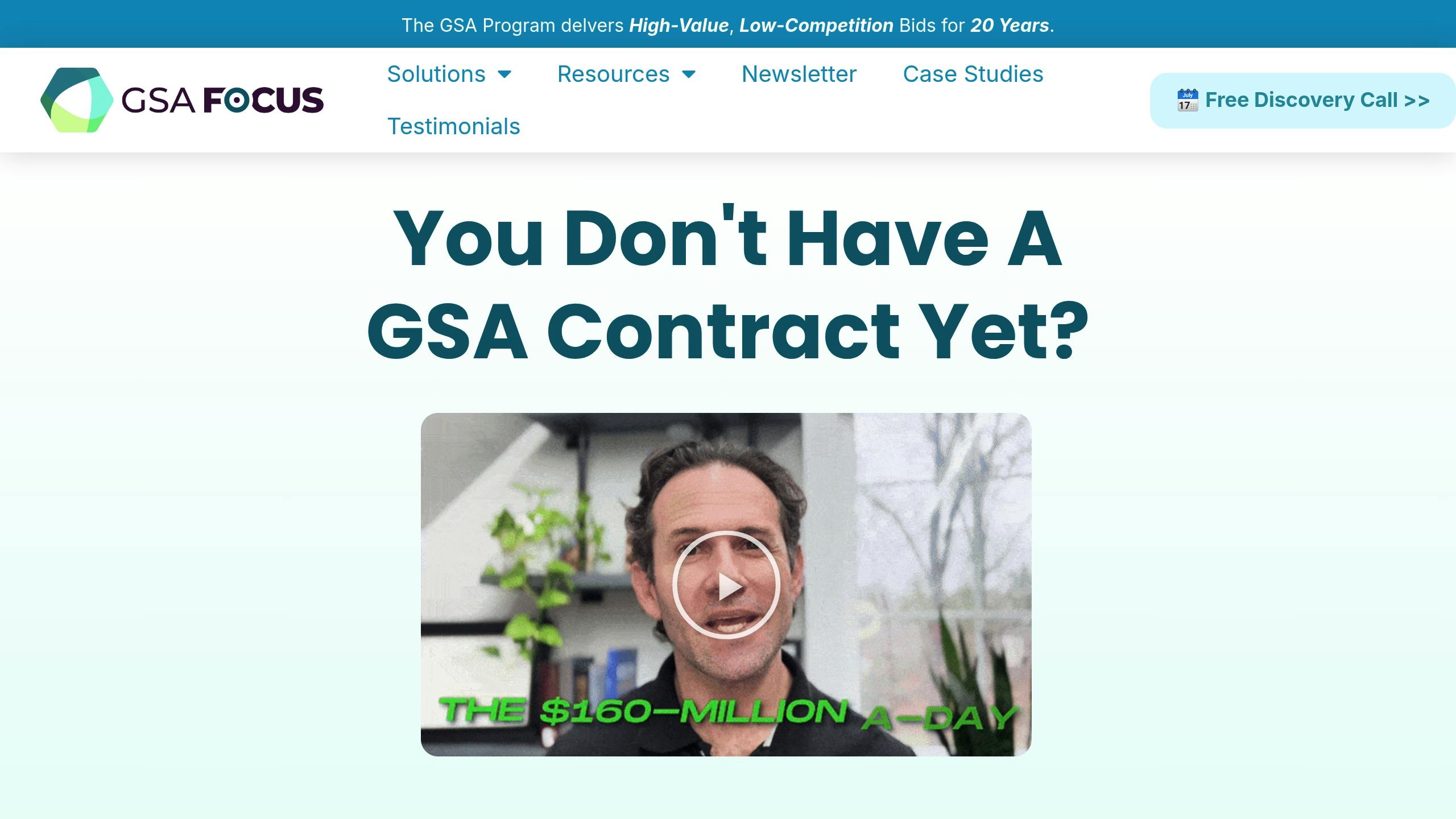A GSA Schedule allows businesses to sell directly to federal agencies, but not everyone qualifies. Here’s a quick breakdown of the key requirements:
- Business History: At least 2 years in operation (exceptions for IT companies under the Springboard Program).
- Financial Stability: Positive cash flow, audited financial records, and no recent bankruptcies.
- Compliance: Must meet Trade Agreements Act (TAA) rules, federal labor standards, and other regulations.
- Registrations: Active SAM.gov profile, DUNS number, and submission of required forms like CSP and CPARS ratings.
- Documentation: Commercial sales invoices, price lists, and proof of Most Favored Customer (MFC) pricing.
Meeting these criteria ensures your business is ready to compete in the federal marketplace. Keep reading for detailed requirements and tips to succeed in the application process.
Does Your Firm Qualify for a GSA Schedule Contract

Basic Requirements for GSA Schedule Contracts
These qualifications expand on the initial criteria, focusing on specific documentation and compliance needs.
Business History Requirements
To meet the business history requirements, you’ll need:
- At least six commercial sales invoices for each product line
- Standard price lists that include discount structures
- Documentation showing Most Favored Customer (MFC) pricing [1][9]
For tech companies, the Springboard IT Program offers an alternative path. IT service providers with less than two years of history can qualify by submitting detailed project records and proving financial stability [1][7].
Federal Rules and Standards
Eligibility also hinges on meeting federal compliance standards:
- TAA compliance is mandatory for product vendors, as highlighted earlier.
- Service providers must adhere to:
Required Registrations and Forms
Before applying, ensure these registrations and forms are completed:
| Requirement | Source |
|---|---|
| DUNS Number | Dun & Bradstreet |
| CSP Form | Internal pricing analysis |
Additionally, vendors must submit three CPARS ratings or equivalent client references to demonstrate past performance [9][7].
Financial Requirements
Financial stability is a key factor for GSA approval. Here’s what they look for:
Required Financial Records
To determine a business’s financial health, the GSA examines several key documents:
| Document Type | Requirements |
|---|---|
| Profit & Loss Statements | Two years of audited statements [1][4] |
| Balance Sheets | Last two fiscal years, showing assets and liabilities [1][4] |
Credit and Cash Flow Review
GSA uses credit and cash flow metrics to evaluate stability:
Credit Assessment:
- Reports from D&B detailing payment history
- A debt-to-equity ratio of 3:1 or lower
- No bankruptcies within the last three years [4][7]
Cash Flow Requirements:
- Operating reserves for at least 3 months
- Six consecutive quarters of positive cash flow
- Receivables collected within 45 days or less [4]
"GSA Focus recommends maintaining 15-20% cash reserves relative to proposed contract values as a best practice."
Common Financial Red Flags:
- Tax liabilities exceeding 10% of total assets [4]
- Negative net income in the most recent fiscal year [9]
- Missing quarterly financial records [1]
For example, a Maryland-based IT firm saw its application denied due to unresolved tax liens [4], highlighting how strictly these standards are enforced.
Meeting these benchmarks is essential. Post-award, businesses must generate $100,000 in sales within the first 60 months and $125,000 in subsequent periods, along with mandatory FASST reporting [7][10].
sbb-itb-8737801
Business Size and Industry Rules
Eligibility for SBA programs isn’t just about financial stability. You also need to meet specific size standards and industry-related compliance rules.
The Small Business Administration (SBA) determines size eligibility based on revenue and employee count:
| Business Type | Measurement | Example Threshold |
|---|---|---|
| Service Industries | Annual Revenue (5-year avg) | IT Services: $34M [5][8] |
| Manufacturing | Employee Count (24-month avg) | 500-1,500 employees [5] |
| Professional Services | Annual Revenue (5-year avg) | Varies by NAICS code [5] |
If your business grows beyond the size limits, you must act quickly to stay compliant. Here’s what to do:
- Update your status on SAM.gov right away.
- Submit a size status update modification.
- Keep managing existing task orders under the "once small, always small" rule [2][5].
Industry-Specific Rules
Each industry has its own set of requirements that go beyond size standards. Here are some examples:
Information Technology:
Healthcare and Medical:
- Requires FDA approvals, cGMP compliance, and other healthcare-specific quality certifications [6].
Professional Services:
- Needs CPARS records, proper licenses, and certified staff [7].
Certain business types aren’t eligible for GSA Schedule participation. These include:
- Weapons or ammunition manufacturers
- Architectural/engineering services
- Construction services [6]
For IT companies applying for cybersecurity SINs, FISMA compliance is a must. This includes third-party assessments and ongoing monitoring protocols [3]. Similarly, medical device manufacturers need to maintain current FDA approvals throughout the contract period [6].
Failing to meet these requirements can affect your eligibility, so it’s essential to stay compliant for the duration of your contract.
Post-Award Requirements
Securing a GSA Schedule contract is just the beginning. To keep your contract in good standing, you need to stay on top of several important compliance tasks.
Yearly Updates
To maintain your GSA Schedule contract, you’ll need to complete several annual tasks. One of the most critical is submitting Commercial Sales Practices (CSP-1) updates to confirm your pricing aligns with Most Favored Customer discounts [1].
Here’s a quick overview of the key annual requirements:
| Requirement | Frequency | Deadline | Impact of Non-Compliance |
|---|---|---|---|
| CSP Updates | Annual | Contract anniversary | Contract suspension |
| GSA Advantage! Price List | Annual | Within 30 days of changes | Removal from catalog |
| Contract Assessment | Once per 5 years | As scheduled | Potential termination |
GSA analysts also perform Contract Assessments to confirm:
- Pricing and payment systems are accurate
- Sales reporting procedures are correctly implemented [3]
Status Changes
If your business undergoes major operational shifts, you’re required to report them promptly. This includes changes like ownership transfers exceeding 50%, mergers, acquisitions, or bankruptcy filings [1][7].
"All entity information changes must be updated in SAM.gov within 3 business days, followed by a corresponding GSA Modification Package" [5]
To avoid compliance issues, it’s essential to track deadlines carefully and keep financial records up to date [1]. Missing these requirements can lead to a Cure Notice, giving you 30 days to resolve the problem before facing potential contract termination [7]. These penalties are similar to the financial reviews conducted before awarding the contract.
Getting Help with GSA Schedule Applications
Navigating the GSA Schedule application process can be challenging, and many businesses find professional assistance invaluable during this phase.
GSA Focus Services

The application process is often intricate, with 62% of initial rejections attributed to mistakes in Commercial Sales Practices (CSP) disclosures and formatting of financial documents [4][1]. Working with experts can help you avoid these common pitfalls and streamline the process.
Professional consultants like GSA Focus provide specialized support. Here’s how their expertise compares to a self-guided approach:
| Metric | Self-Application | With Professional Help | Improvement |
|---|---|---|---|
| Average Approval Time | 12+ months | 6-8 months | 40% faster |
| Revision Requests | Multiple rounds | 75% fewer requests | Significant reduction |
| First-Year Sales | Baseline | 300% higher | Better performance |
| Contract Renewal Rate | 67% | 92% | Higher success |
Consultants focus on critical areas that often lead to application rejections, including:
- Document Preparation: Ensuring financial statements and past performance records meet requirements.
- Compliance Verification: Confirming TAA compliance and proper registration on SAM.gov [1][7].
- Pricing Strategy: Crafting competitive pricing models that align with GSA’s "fair and reasonable" standards [12].
- Negotiation Support: Handling communications with contracting officers to secure favorable terms.
Data shows that businesses working with consultants can save $15,000-$25,000 in opportunity costs by speeding up their eligibility for procurement [11][6].
When selecting a consultant, look for:
- Experience with your NAICS code
- Transparent pricing structures
- Availability of post-award support [6]
For businesses facing complex compliance challenges, the right consultant can make all the difference. By choosing experts who understand your industry’s specific requirements, you can expect faster approvals and better outcomes in federal contracting.
Summary
To qualify for a GSA Schedule, businesses need to meet four key criteria: established operational history, financial stability, adherence to regulations, and commercial readiness. These requirements ensure companies are prepared to compete in the federal marketplace under the GSA MAS program.
A critical aspect is offering fair and reasonable pricing, which must align with or be better than the rates provided to a company’s Most Favored Customer (MFC) [1][7]. Staying compliant is essential for maintaining the contract, which includes tasks like annual sales reporting and adhering to Trade Agreements Act (TAA) standards [1][7].
For businesses needing guidance, several resources can simplify the process:
- GSA training programs and webinars [7]
- Procurement Technical Assistance Centers (PTACs)
- Consulting firms specializing in GSA Schedule applications
Successfully meeting these requirements unlocks the potential for federal contracting opportunities through the GSA Multiple Award Schedule (MAS) program [6].
Related Blog Posts
- How To Qualify for a GSA Schedule
- How to Read GSA Solicitation Documents
- Ultimate Guide to GSA Compliance Standards
- How to Prepare a GSA Schedule Proposal


